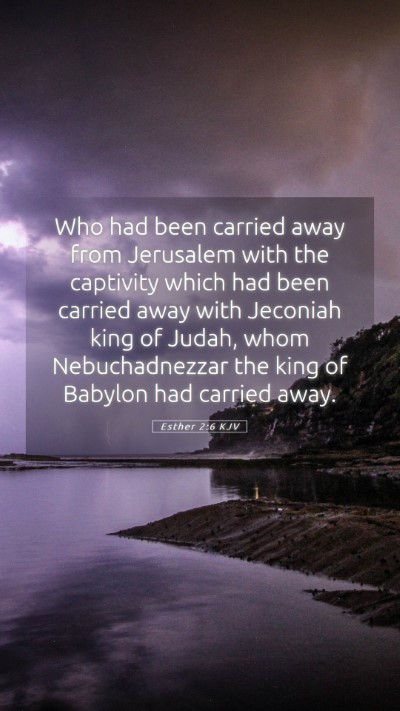Old Testament
Genesis Exodus Leviticus Numbers Deuteronomy Joshua Judges Ruth 1 Samuel 2 Samuel 1 Kings 2 Kings 1 Chronicles 2 Chronicles Ezra Nehemiah Esther Job Psalms Proverbs Ecclesiastes Song of Solomon Isaiah Jeremiah Lamentations Ezekiel Daniel Hosea Joel Amos Obadiah Jonah Micah Nahum Habakkuk Zephaniah Haggai Zechariah MalachiEsther 2:6 Meaning
What is the meaning of Esther 2:6?
Who had been carried away from Jerusalem with the captivity which had been carried away with Jeconiah king of Judah, whom Nebuchadnezzar the king of Babylon had carried away.
Esther 2:6 Bible Verse Meaning
Bible Verse Meaning: Esther 2:6
Esther 2:6 reads: "Who had been carried away from Jerusalem with the captivity which had been carried away with Jeconiah king of Judah, whom Nebuchadnezzar the king of Babylon had carried away." This verse brings to light the background of Esther, as one of the exiled Jews, indicating her ancestry and the historical context of her life.
Understanding Esther 2:6
This verse lays a foundational understanding of Esther's identity and her place within the larger narrative of the Jewish exile. By examining this verse, we gain insight into the purpose and implications of exile in the life of God’s people.
Insights from Public Domain Commentaries
-
Matthew Henry's Commentary
Henry emphasizes that this verse is critical for understanding Esther's lineage and heritage. Esther, being a member of the exiled people, underscores the challenges faced by the Jewish community in Babylon. It also points to God's providence, as He prepares individuals for significant roles in His plans.
-
Albert Barnes' Notes on the Bible
Barnes notes that the mention of Jeconiah as a historical figure connects Esther to the royal lineage, implying that despite her status as an exile, she retains a claim to nobility. The chapter illustrates how God can work through unlikely circumstances for the preservation and deliverance of His people.
-
Adam Clarke's Commentary
Clarke points out the importance of recognizing the historical ramifications of the Babylonian exile. This verse serves as a reminder that God's people can experience displacement, yet they continue to have a significant role in His divine narrative. Clarke suggests that Esther’s background contributes to her character development and readiness for her future challenges.
Key Themes and Applications
The narrative of Esther begins with profound insights into the themes of:
- Identity amidst Exile: This verse reinforces the notion that identity can endure through challenging circumstances.
- God’s Sovereignty: The historical context stresses God’s control over national events and individual lives.
- Preparation for Purpose: Esther’s lineage hints at the significant role she is destined to play in the unfolding providence of God.
Application in Daily Life
As we reflect on this verse, we can apply the following principles:
- Recognize our identities through the lens of our spiritual heritage, even in difficult times.
- Trust in God’s overarching plan, knowing that our circumstances serve a divine purpose.
- Believe in the potential within us, regardless of our current situations, to impact the world positively.
Related Bible Cross References
- 2 Kings 24:14-16: Discusses the exile of Judah and the carrying away of people to Babylon.
- Jeremiah 29:4-7: Encourages the exiles to seek the welfare of their city in exile.
- Daniel 1:1-3: Details the taking of captives during the Babylonian siege, including nobles and youth.
Conclusion
Esther 2:6 provides a glimpse into the life of a woman who would rise to prominence despite her circumstances. The insights drawn from this verse encourage readers to consider the implications of their own identities and the roles they are called to play by God. Understanding such verses with the help of reliable Bible commentaries enriches our Bible study insights and deepens our Bible verse understanding.


